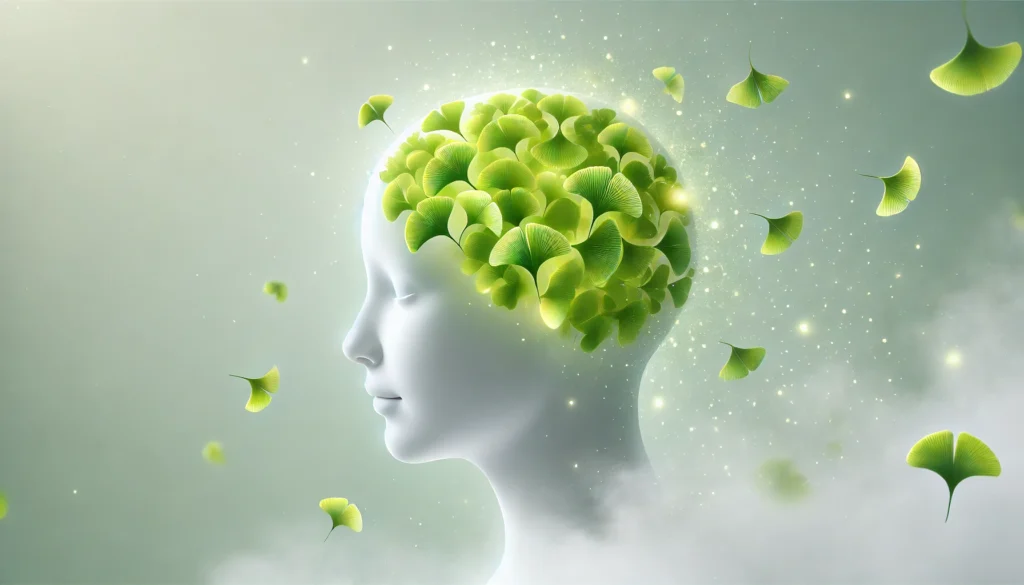Introduction: Unpacking the Mystery of Brain Fog and the Promise of Ginkgo Biloba
In today’s hyper-connected, cognitively demanding world, brain fog has become a common complaint across all age groups. Characterized by forgetfulness, difficulty concentrating, mental fatigue, and a general sense of cognitive sluggishness, brain fog can impact productivity, mood, and overall quality of life. While not a medically defined condition, it is increasingly recognized as a significant barrier to optimal cognitive performance. Amid the growing interest in natural remedies for cognitive enhancement, Ginkgo biloba—an ancient herbal extract derived from the leaves of the Ginkgo tree—has emerged as a leading contender. But can Ginkgo Biloba truly help with brain fog? In this article, we explore the evidence surrounding ginkgo biloba brain fog relief, dissecting both its historical context and modern clinical research to understand how it may influence mental clarity.
You may also like: Ginkgo Biloba Benefits for Creative Thinking: How This Ancient Herb Supports Cognitive Clarity and Focus
Understanding Brain Fog: Causes, Symptoms, and Impacts on Daily Life
Before diving into the science of Ginkgo biloba, it’s essential to understand what brain fog actually entails. Though not a clinical diagnosis, brain fog describes a constellation of cognitive symptoms that include slowed thinking, forgetfulness, impaired concentration, and a general sense of mental haziness. Many people describe it as feeling “off,” or as if their thoughts are moving through molasses. Brain fog can be triggered by a wide range of factors, including chronic stress, poor sleep, hormonal changes, medications, nutritional deficiencies, and underlying medical conditions such as fibromyalgia, chronic fatigue syndrome, and autoimmune diseases.
The symptoms of brain fog are not only disruptive but often distressing, especially for individuals who rely heavily on cognitive performance in their professional and personal lives. Students, knowledge workers, and creatives are particularly vulnerable to the impacts of persistent mental fatigue. This is where the search for safe, effective, and natural cognitive enhancers becomes crucial—and where ginkgo brain fog research begins to attract attention.

Ginkgo Biloba in Historical and Traditional Medicine
Ginkgo biloba is one of the oldest living tree species, with roots tracing back over 270 million years. It has been used in traditional Chinese medicine for centuries, primarily for ailments related to the lungs, heart, and brain. Ancient practitioners believed that Ginkgo leaves could promote circulation and support mental vitality. In traditional practices, ginkgo was often prescribed to improve memory and treat conditions related to cognitive decline, even before such conditions were well understood by modern medical standards.
Its long-standing use in ancient medicine laid the foundation for its modern-day exploration in cognitive science. As researchers began to isolate the active compounds in Ginkgo—namely flavonoids and terpenoids—they discovered their powerful antioxidant and anti-inflammatory properties. These bioactive molecules became the focus of scientific inquiry into whether ginkgo biloba brain fog relief was a credible possibility or merely anecdotal.
Phytochemical Profile: What Makes Ginkgo Biloba Unique?
The cognitive-enhancing potential of Ginkgo biloba lies primarily in its complex chemical makeup. Two primary groups of bioactive compounds—flavonoids and terpenoids—are responsible for many of its neurological effects. Flavonoids, such as quercetin and kaempferol, act as potent antioxidants that neutralize free radicals, thereby protecting brain cells from oxidative stress. Oxidative damage is known to impair neuronal function and is implicated in age-related cognitive decline.
Terpenoids, particularly ginkgolides and bilobalide, improve blood flow by dilating blood vessels and reducing platelet aggregation. This vascular action is crucial for delivering oxygen and nutrients to the brain, which are essential for optimal cognitive performance. Together, these compounds support the hypothesis that ginkgo brain fog intervention may work through a combination of enhanced circulation, neuroprotection, and inflammation reduction. These mechanisms form the scientific foundation for Ginkgo’s potential to clear the mental haze associated with brain fog.
Modern Scientific Evidence Supporting Ginkgo for Cognitive Function
A growing body of research has investigated the effects of Ginkgo biloba on various aspects of cognitive function. Numerous double-blind, placebo-controlled studies have examined whether ginkgo can improve memory, executive function, and attention span. While results have varied depending on study design and participant demographics, several well-designed trials have shown modest but statistically significant cognitive benefits.
For example, a systematic review published in Psychopharmacology found that standardized Ginkgo biloba extract improved cognitive performance in healthy adults, particularly in tasks requiring sustained attention and memory recall. Another study in Human Psychopharmacology demonstrated that acute doses of ginkgo enhanced working memory and processing speed in middle-aged adults. These findings suggest that Ginkgo may offer short-term cognitive boosts, making it a promising supplement for individuals experiencing transient brain fog.
Clinical Evidence for Ginkgo Biloba and Brain Fog Specifically
While much of the research on Ginkgo biloba has focused on memory and general cognitive function, a smaller but growing subset of studies has looked directly at its effects on brain fog. In clinical settings, brain fog often presents in populations with fibromyalgia, post-COVID syndrome, menopause, and chronic fatigue. In one study involving post-COVID patients reporting persistent brain fog, Ginkgo supplementation was associated with improved cognitive clarity and reduced mental fatigue over a 12-week period.
In another trial focused on perimenopausal women—a group particularly vulnerable to hormonal brain fog—participants who took Ginkgo biloba extract reported better focus, reduced forgetfulness, and improved mental energy. While more large-scale, randomized studies are needed to confirm these results, these findings support the practical use of Ginkgo biloba brain fog relief strategies across diverse populations. They also suggest that Ginkgo may be particularly helpful when brain fog is linked to vascular insufficiency or inflammatory processes.
How Ginkgo Biloba Enhances Blood Flow to the Brain
One of the most studied mechanisms of Ginkgo biloba is its ability to improve cerebral circulation. Poor blood flow to the brain is a key contributor to symptoms of brain fog, particularly in individuals with vascular issues or sedentary lifestyles. Ginkgo’s terpenoids—especially ginkgolide B—act as vasodilators, expanding blood vessels and increasing oxygen delivery to brain tissue.
By enhancing cerebral perfusion, Ginkgo ensures that neurons receive the nutrients they need for optimal function. This is particularly beneficial for older adults, whose vascular systems may not be as efficient. Studies using advanced imaging techniques like SPECT and fMRI have confirmed increased blood flow in the brain following ginkgo supplementation. For individuals seeking to alleviate ginkgo brain fog symptoms, this vascular support may be one of the supplement’s most valuable effects.
Ginkgo Biloba’s Antioxidant and Anti-Inflammatory Effects
Oxidative stress and neuroinflammation are two of the most common culprits in the development of cognitive dysfunction. Ginkgo biloba’s antioxidant properties combat oxidative stress by neutralizing harmful free radicals that damage neurons and impair synaptic function. Its flavonoids act as scavengers of these reactive molecules, thereby protecting brain tissue from premature aging and dysfunction.
In addition to its antioxidant action, Ginkgo also reduces inflammation in the brain. Chronic low-grade inflammation is a recognized contributor to cognitive fatigue and mental sluggishness. Research has shown that Ginkgo can downregulate pro-inflammatory cytokines such as TNF-alpha and IL-6, both of which are elevated in individuals with cognitive complaints. This dual action—fighting oxidation and inflammation—adds to the growing rationale behind using ginkgo biloba brain fog interventions in people experiencing cognitive fogginess tied to these biochemical stressors.
Ginkgo Biloba’s Effects on Neurotransmitters and Mood
Brain fog is not only a cognitive issue but also often has emotional and psychological components. Many individuals report concurrent symptoms of low mood, anxiety, or lack of motivation. Ginkgo biloba appears to influence neurotransmitter levels in the brain, particularly dopamine and serotonin, which play critical roles in mood regulation and mental focus.
By modulating these neurotransmitters, Ginkgo may help enhance motivation, reduce stress, and improve overall mental clarity. Several animal studies and preliminary human trials have demonstrated anxiolytic (anti-anxiety) and antidepressant-like effects with Ginkgo supplementation. For individuals whose ginkgo brain fog symptoms are tied to emotional stress or mood instability, these neurotransmitter effects could provide an additional layer of therapeutic benefit.

Frequently Asked Questions (FAQ) on Ginkgo Biloba and Brain Fog
1. Can ginkgo biloba help with brain fog caused by long-term stress or burnout?
Chronic stress and burnout are increasingly recognized as drivers of cognitive dysfunction, often manifesting as persistent brain fog. In these cases, ginkgo biloba may offer relief by modulating the stress response system, particularly through its effects on cortisol regulation and adrenal function. Emerging evidence suggests that Ginkgo’s adaptogenic properties help restore cognitive resilience by stabilizing stress hormone fluctuations, which can otherwise disrupt neurotransmission. Moreover, the anti-fatigue effects reported in some clinical trials hint at broader applications for mental exhaustion beyond standard cognitive decline. While not a cure-all, the potential for ginkgo biloba brain fog relief in stress-related cases warrants further exploration in personalized wellness protocols.
2. How long does it typically take to notice improvements in brain fog with ginkgo biloba?
Most users report subtle cognitive shifts within two to four weeks of consistent Ginkgo biloba supplementation, although this varies depending on the underlying cause of brain fog. For individuals using ginkgo brain fog strategies as part of recovery from illness or medication side effects, longer durations—such as 8 to 12 weeks—may be needed to observe measurable improvements. Factors such as dosage, extract standardization, and lifestyle habits play a crucial role in the speed and magnitude of results. Timeframes also differ based on age, with older adults typically requiring more prolonged usage to experience significant cognitive enhancements. Patience and consistency remain key when evaluating Ginkgo’s impact on mental clarity over time.
3. Are there specific types or formulations of ginkgo biloba that work better for brain fog?
Standardized extracts, particularly those containing 24% flavone glycosides and 6% terpene lactones, are considered the most effective for cognitive purposes. These formulations ensure consistent bioavailability of the active compounds linked to improved cerebral blood flow and reduced oxidative stress. Liquid extracts and liposomal forms may offer faster absorption, which some users find beneficial when targeting acute episodes of ginkgo brain fog. On the other hand, whole-leaf powders are less studied and may provide inconsistent results due to variable phytochemical content. When selecting a ginkgo product for brain fog, prioritizing clinically studied formulations with transparent quality testing is essential for efficacy and safety.
4. Can ginkgo biloba be used alongside nootropics or adaptogens to enhance its effects on brain fog?
Ginkgo biloba is frequently used in combination with other cognitive enhancers such as bacopa monnieri, rhodiola rosea, and L-theanine. These synergistic blends can amplify results by targeting multiple biological pathways associated with brain fog, including neurotransmitter balance, neuroinflammation, and mental fatigue. For example, combining ginkgo with a cholinergic nootropic may support memory encoding while reducing the sluggish processing speed often linked to ginkgo biloba brain fog. Adaptogens like ashwagandha further help modulate stress-induced fog by stabilizing cortisol, while ginkgo maintains blood flow and oxygenation. However, professional guidance is recommended to avoid overstimulation or unwanted herb-drug interactions in complex stacks.
5. Is ginkgo biloba effective for brain fog in perimenopausal or menopausal women?
Hormonal fluctuations during perimenopause and menopause are well-known contributors to memory lapses, poor concentration, and general brain fog. Ginkgo biloba’s vasodilatory and neuroprotective effects may be particularly helpful in this context, as they counteract the estrogen-related decline in cerebral perfusion. In some studies, women reported improved clarity, reduced forgetfulness, and enhanced multitasking ability after several weeks of Ginkgo use. Additionally, its mild mood-stabilizing properties may support emotional balance, which indirectly reduces the mental clutter associated with cognitive fatigue. For those exploring non-hormonal solutions, ginkgo brain fog interventions may serve as a safe and supportive option.
6. Are there any dietary or lifestyle changes that can boost ginkgo biloba’s effectiveness for brain fog?
Yes, optimizing your lifestyle can significantly enhance the cognitive benefits of Ginkgo biloba. Hydration, regular aerobic exercise, and a diet rich in omega-3 fatty acids, magnesium, and B-complex vitamins synergize with ginkgo’s effects on neural connectivity and circulation. Sleep hygiene is particularly critical, as sleep deprivation exacerbates the same mechanisms—like oxidative stress and inflammation—that Ginkgo works to counteract. Additionally, reducing processed sugar and limiting alcohol can minimize metabolic contributors to ginkgo biloba brain fog. When integrated into a broader wellness strategy, Ginkgo is far more effective in supporting long-term mental clarity.
7. Can ginkgo biloba help with brain fog following viral infections or post-viral syndromes?
Post-viral brain fog, especially following COVID-19, has gained attention for its persistence and impact on daily functioning. Preliminary data suggests that ginkgo biloba may alleviate these symptoms by improving cerebral microcirculation and reducing neuroinflammation, both of which are common in post-viral states. Some post-COVID protocols include ginkgo to support cognitive rehabilitation, although more robust studies are needed to establish definitive guidelines. Anecdotal reports from long-haulers frequently mention gradual improvement in clarity and processing speed when using ginkgo brain fog supplements. While it should not replace clinical treatment, Ginkgo may be a valuable adjunct in multidisciplinary recovery plans.
8. Does ginkgo biloba improve focus and attention span in younger adults experiencing brain fog?
Younger adults often encounter brain fog due to digital overload, academic burnout, or disrupted sleep cycles. In these cases, Ginkgo biloba appears to enhance attentional control and mental stamina by increasing prefrontal cortex perfusion and modulating dopamine activity. Several small-scale trials have noted improvements in reaction time and sustained attention in healthy young individuals after ginkgo supplementation. This makes it a potential tool not only for cognitive recovery but also for performance optimization under high-demand scenarios. However, setting realistic expectations is key, as Ginkgo supports—but does not replace—healthy lifestyle foundations for managing ginkgo biloba brain fog in young adults.
9. Can long-term use of ginkgo biloba support ongoing mental clarity, or does its effectiveness plateau over time?
Long-term users often report sustained mental clarity, especially when ginkgo is used preventively rather than reactively. Unlike stimulants that create tolerance or diminishing returns, ginkgo biloba exerts its benefits more subtly through vascular and neuroprotective mechanisms that can be maintained with consistent use. There is some evidence suggesting that long-term ginkgo usage may support structural brain health, including gray matter preservation and hippocampal integrity. For individuals managing chronic sources of cognitive strain—such as autoimmune conditions or neuroinflammation—ginkgo brain fog strategies may remain effective over extended periods without inducing dependency. Still, periodic assessment of its impact is advised to ensure continued relevance within one’s cognitive regimen.
10. Are there any populations who should avoid using ginkgo biloba for brain fog?
While generally safe, ginkgo biloba may not be appropriate for everyone. Individuals taking blood thinners, anticoagulants, or antiplatelet medications should exercise caution due to Ginkgo’s natural effects on circulation and platelet aggregation. Pregnant or breastfeeding individuals are also advised to avoid it, given the lack of robust safety data. People with seizure disorders or those preparing for surgery should consult their healthcare providers before using Ginkgo. In rare cases, mild side effects such as headaches, dizziness, or gastrointestinal discomfort have been reported. These considerations underscore the importance of personalized evaluation when considering ginkgo biloba brain fog interventions.

Ginkgo Biloba for Age-Related Cognitive Decline: A Protective Strategy
Aging is a major risk factor for brain fog and cognitive decline. As we age, our brains experience a natural decrease in blood flow, neurotransmitter production, and neuronal plasticity. Ginkgo biloba has been extensively studied in older populations, especially in the context of mild cognitive impairment (MCI) and early Alzheimer’s disease.
Further Reading:
Don’t buy into brain health supplements
Brain Fog: Solutions to Help You Improve Concentration
natural brain supplements, cognitive enhancement herbs, mental fatigue remedies, memory support supplements, natural focus boosters, brain health nutrients, herbal cognitive enhancers, improve mental clarity naturally, supplements for concentration, cerebral blood flow support, antioxidant brain support, neuroprotective herbs, adaptogens for brain fog, herbal remedies for focus, mental performance enhancers, botanical nootropics, support for memory and focus, herbs for cognitive function, natural solutions for brain health, plant-based brain support
.Important Note: The information contained in this article is for general informational purposes only, and should not be construed as health or medical advice, nor is it intended to diagnose, prevent, treat, or cure any disease or health condition. Before embarking on any diet, fitness regimen, or program of nutritional supplementation, it is advisable to consult your healthcare professional in order to determine its safety and probable efficacy in terms of your individual state of health.
Regarding Nutritional Supplements Or Other Non-Prescription Health Products: If any nutritional supplements or other non-prescription health products are mentioned in the foregoing article, any claims or statements made about them have not been evaluated by the U.S. Food and Drug Administration, and such nutritional supplements or other health products are not intended to diagnose, treat, cure, or prevent any disease.


